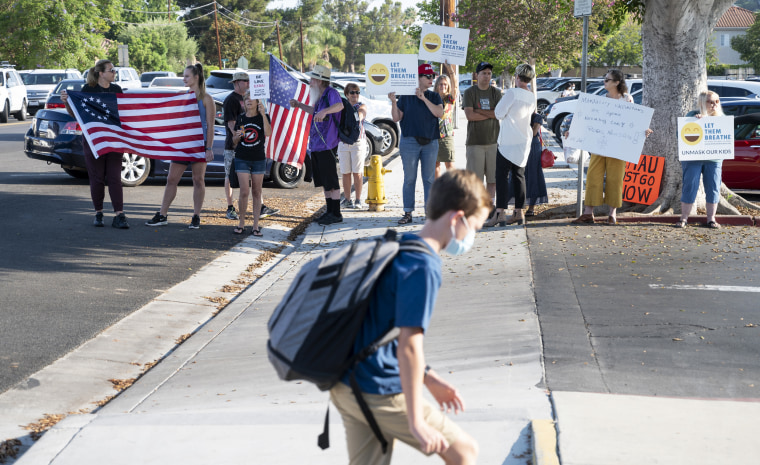One of the first pieces of advice a veteran teacher gives a novice is to set the classroom tone in the first few weeks of school: Letting early disruptions slide can mean ongoing misbehavior that hinders learning. This year, it’s the adults who are misbehaving, with few educators prepared for the verbal and physical attacks that have marked the start of another not-normal year.
These protests are taking place at town halls and school parking lots, but they have their genesis elsewhere.
Protestors burning masks, ripping masks off educators’ faces and hurling obscenities have disrupted and derailed education board meetings nationwide this summer as local officials have sought to allow in-person learning despite a new wave of Covid-19 cases powered by the delta variant of the coronavirus.
These protests are taking place at town halls and school parking lots, but they have their genesis elsewhere. They’ve been sparked and fanned by right-wing media personalities with national platforms and by politicians and social media agitators who’ve taken to calling school mask mandates “child abuse” — and the teachers who support them child abusers. Protests have reached a fever pitch as the topic dominates school board agendas alongside and often intermingled with issues like the manufactured panic over critical race theory.
At a school board meeting in Connecticut where residents expressed their views about district business, one father moved smoothly from raging about critical race theory to raging about masks, declaring that he was pulling his children from the schools. He then turned away from the democratically elected board to speak directly to a jeering, cheering subset of parents assembled. He may have been a champion to these parents, but in reality he is in the minority, albeit a minority who refuse consensus.
Frighteningly, the anger seems to be escalating. In the past week, authorities said, a mother in Texas tore a teacher’s mask from her face and a father in California verbally assaulted a principal and physically attacked a teacher who intervened, sending him to the hospital.
Through the pandemic, others in public-facing jobs asked to enforce mask mandates, like retail employees, have been subjected to hectoring and threats. And educators have long dealt with violence from students and parents. So recent attacks on educators may not seem any different from these sadly familiar acts, but they are — and we should be alarmed by them.
We have research showing the benefits to students of positive parental engagement in schools; we don’t need research to predict harm from the toxic engagement we’re now witnessing.
At the most basic level, such incidents teach children that violence can and should be used in self-advocacy and to solve problems. But they also introduce damaging attitudes transmitted to children about their teachers: that they can’t be trusted, don’t care about them, shouldn’t be listened to. We have research showing the benefits to students of positive parental engagement in schools; we don’t need research to predict harm from the toxic engagement we’re now witnessing.
A decadeslong drumbeat of negativity about schools from politicians and pundits has led Americans to have a low opinion of them nationally. Even so, the majority of parents have regarded their children’s own schools and teachers highly. This is because they’ve been able to meet and talk with their teachers, hear from their children about them and understand them as professionals and partners invested in their children’s growth — as well as neighbors and human beings. They’ve been able to mostly separate their personal experiences from the national conversations, a distinction in danger of erasure.
Public schools are one of the last, most important spaces where we are “we.” They’re where the greatest number of a town’s residents physically gather daily to promote the success of the same project. They’re where community happens, where people from different neighborhoods and backgrounds meet, collaborate and compete and where mutual decision-making takes place. Often, the decisions listed on school board agendas seem small: How much will we pay a coach, or when will we hold graduation? But they are frequently bigger: choosing to fund another counselor who ends up saving a suicidal child’s life. And they are always, essentially enormous: deciding what and how the next generation of Americans should learn about themselves, one another, their country and the world.
Schools have, as Charles Blow explained in a recent column, “always been auxiliary battlegrounds for the country’s larger culture wars.” Now community divisions are not only reflected but also created and deepened there. The teacher in that space is viewed by a small, loud contingent not as a public servant but as a public enemy. The parent becomes to the teacher an object of fear, not respect. Without trust, children won’t be able to learn to identify with something bigger than themselves, to know and care about more than just family. Without trust, the community at the center of the community breaks apart.
What happens when we turn away from schools not because of distractions but because of rage and self-righteousness? We turn away from both community and democracy, of which public schools, as their forefather Horace Mann stated, are “the cornerstone.” Lose this and we become not a nation but a series of towns filled with people who make decisions based solely on self-interest. To preserve it, we need to de-escalate, to remember who we are: neighbors and fellow citizens. And we need to remember what we are arguing about: a piece of cloth designed to keep us individually and collectively safe. It cannot become the flag we wave in surrender.

